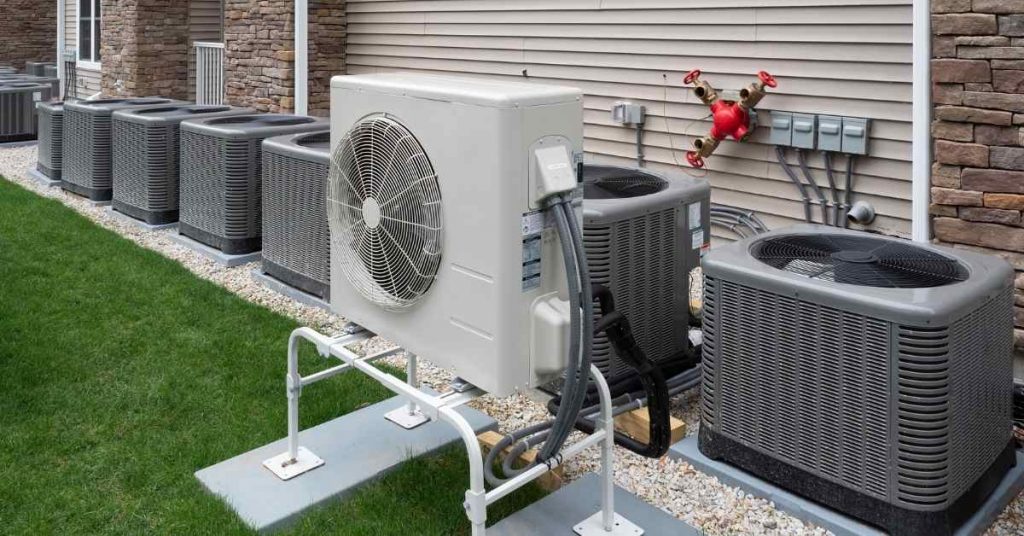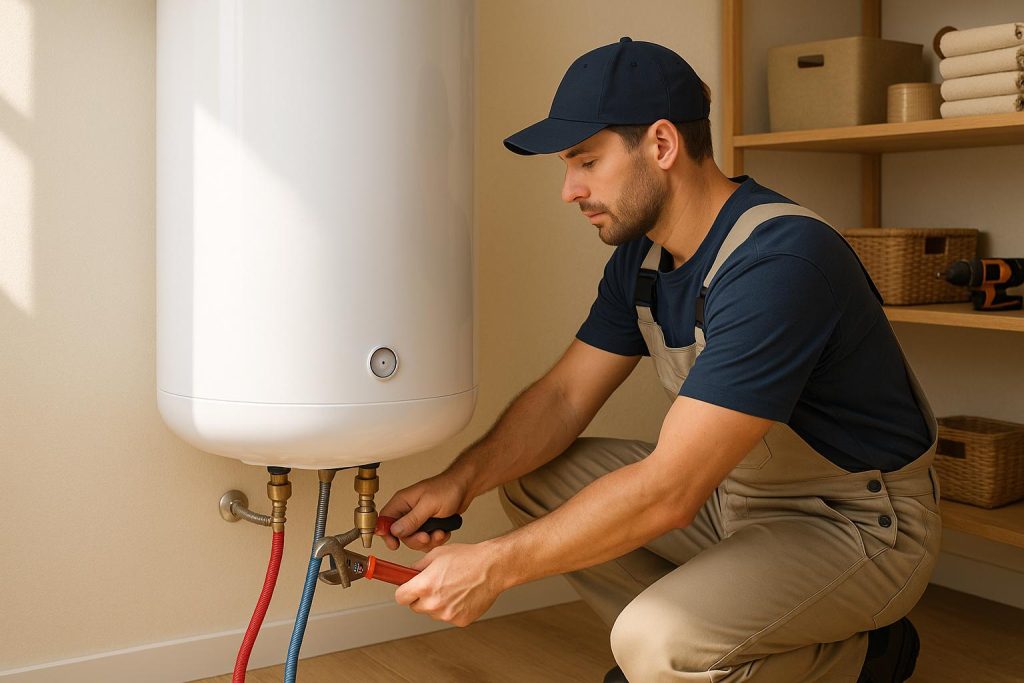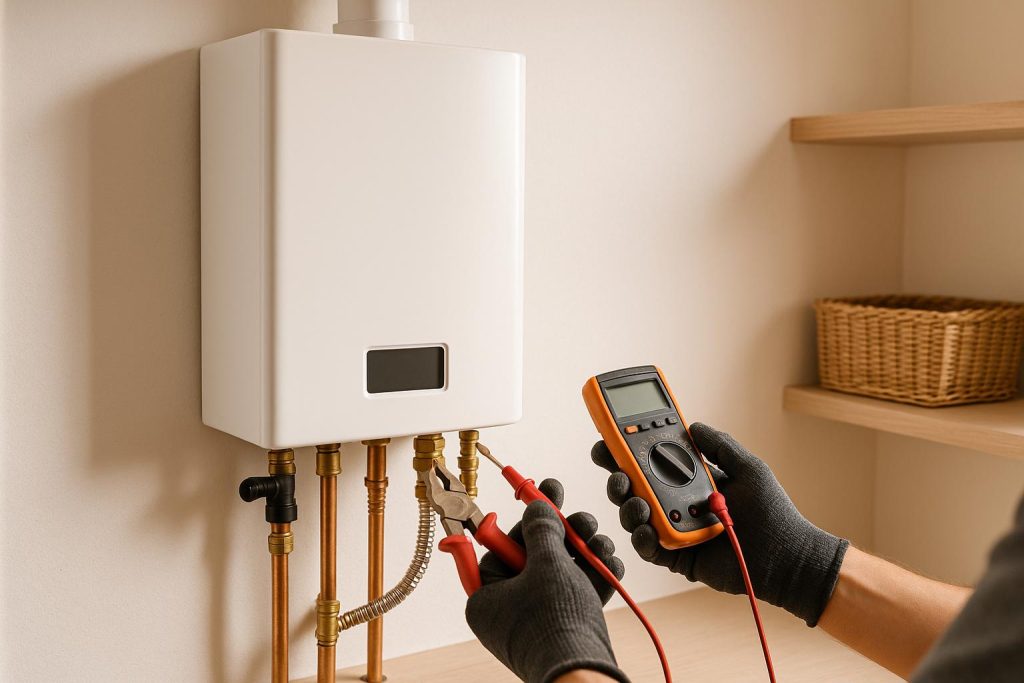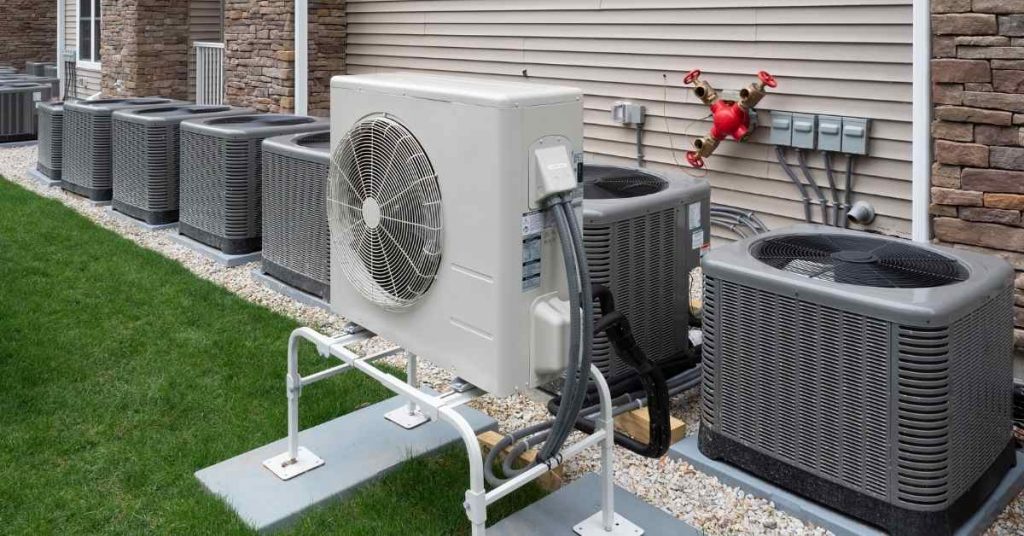
Heat pumps and air conditioners are both HVAC systems used for cooling, but they operate differently and have distinct characteristics. Here’s a comprehensive guide highlighting the differences between heat pumps and air conditioners:
1. Operation
- Heat Pump: A heat pump is a versatile HVAC system that can provide both cooling and heating. It operates by transferring heat from one location to another. In the summer, it removes heat from inside your home and releases it outside. In the winter, it reverses this process, extracting heat from the outdoor air (or ground) and bringing it inside to heat your home.
- Air Conditioner: An air conditioner, on the other hand, is designed solely for cooling. It removes heat from the indoor air and releases it outside. Air conditioners do not have the capability to provide heating.
2. Heating Efficiency
- Heat Pump: Heat pumps are highly energy-efficient for heating because they move existing heat rather than generating it. They can provide substantial energy savings compared to traditional electric resistance heating systems.
- Air Conditioner: Air conditioners do not offer heating capabilities, so they do not contribute to heating efficiency in the winter.
3. Energy Source
- Heat Pump: Heat pumps can be powered by electricity or other renewable energy sources like geothermal or solar. They are more environmentally friendly and have lower carbon emissions compared to heating systems that rely on fossil fuels.
- Air Conditioner: Air conditioners are typically powered by electricity and are used exclusively for cooling.
4. Climate Suitability
- Heat Pump: Heat pumps are most effective in regions with moderate climates, where the temperature doesn’t drop significantly below freezing for extended periods. In extremely cold climates, the efficiency of air-source heat pumps may decrease, but geothermal heat pumps can perform well in cold conditions.
- Air Conditioner: Air conditioners are suitable for warm to hot climates and are not designed for heating in cold weather.
5. Cost
- Heat Pump: The initial cost of purchasing and installing a heat pump can be higher than that of an air conditioner due to its dual heating and cooling capabilities. However, the potential energy savings over time may offset the initial investment.
- Air Conditioner: Air conditioners are generally less expensive upfront since they only provide cooling. However, operating costs can be higher, especially in areas with hot summers.
6. Maintenance
- Heat Pump: Heat pumps require regular maintenance to ensure optimal performance, as they operate year-round for both heating and cooling.
- Air Conditioner: Air conditioners also require maintenance but may not be used as frequently in cooler climates.
7. Environmental Impact
- Heat Pump: Heat pumps have a lower environmental impact, as they are more energy-efficient and can use renewable energy sources.
- Air Conditioner: Air conditioners consume electricity, which may be generated from fossil fuels, contributing to higher carbon emissions.
8. Versatility
- Heat Pump: Heat pumps offer year-round comfort, making them versatile for all seasons.
- Air Conditioner: Air conditioners are designed solely for cooling and cannot provide heating.
| Factor | Refinishing | Liner | Replacement |
|---|---|---|---|
| Cost | $300-$600 | $850-$2000 | $1300-$7000 |
| Reliability | High | Low | Very high |
| DIY | Yes | No | Yes |
| Durability | Moderate | It depends | Durable |
| Time it takes | 4-5 hours | <2 weeks | 1 day |
| Weather-dependent | Yes | No | No |
| Variety/Options | No | Yes | Yes |
| House value | No change | No change | Increases |
Both heat pumps and air conditioners are great options to install. However, a heat pump is more effective in areas with moderate climate. In areas where the temperature can dip below 30 degrees, a heat pump will simply not keep up, making an AC and furnace the better choice.
Heat pumps cool the house just as well as air conditioners. You wouldn’t tell them apart. As a matter of fact, when in cooling mode the efficiency and energy costs of heat pumps and air conditioners are almost the same.
For most people, it is not easy telling heat pumps and air conditioners apart. Both have outside and indoor units which looks exactly the same. So, how can you tell what you have?
Turn your thermostat to the HEAT mode then dash out to the outside/condenser unit. If the unit starts to run, you indeed have a heat pump otherwise it is an air conditioner. You can also search the unit’s serial number online for confirmation.
How Heat Pumps and Air Conditioners Work
As I have mentioned above, an air conditioner works the exact same way as a heat pump when cooling the house.
The outside unit (containing the condenser coil and compressor) is connected to the indoor unit (the evaporator coil) using copper tubes to form a closed loop. A refrigerant is circulated between the 3 components where it changes from gas to liquid and back to gas.
Ideally, refrigerants (used to be Freon but now R-410A) have a low boiling point. That helps them to evaporate easily and in the process take away heat from the house. More on that in this post.
The compressor is the engine of the air conditioner or heat pump. It compresses the refrigerant gas and in the process increase its temperature and pressure. When you compress a gas, its temperature increases.
When the compressed refrigerant gas enters the condenser coil, a fan blows cooler air over it which takes away heat from the refrigerant. By the time the refrigerant is exiting the condenser coil it will be in its liquid state, meaning that it will be very cold.
The now liquid refrigerant enters the evaporator coil inside the house where a fan draws hot air from the house and forces it over the coil. The refrigerant absorbs heat from the air and cools it in the process.

Cold air is then circulated throughout the house via air ducts. After absorbing heat from the indoor air, the refrigerant evaporates and goes back to the compressor whereby the cycle is repeated.
How Does a Heat Pump Heat the House?
As I mentioned, an air conditioner will only cool the house but will not heat it as is the case with a heat pump. So, how does a heat pump manage to reverse the cycle?
A heat pump has a very critical device called a reversing valve. As its name implies, the reversing valve reverses the direction of flow of the refrigerant from the compressor.
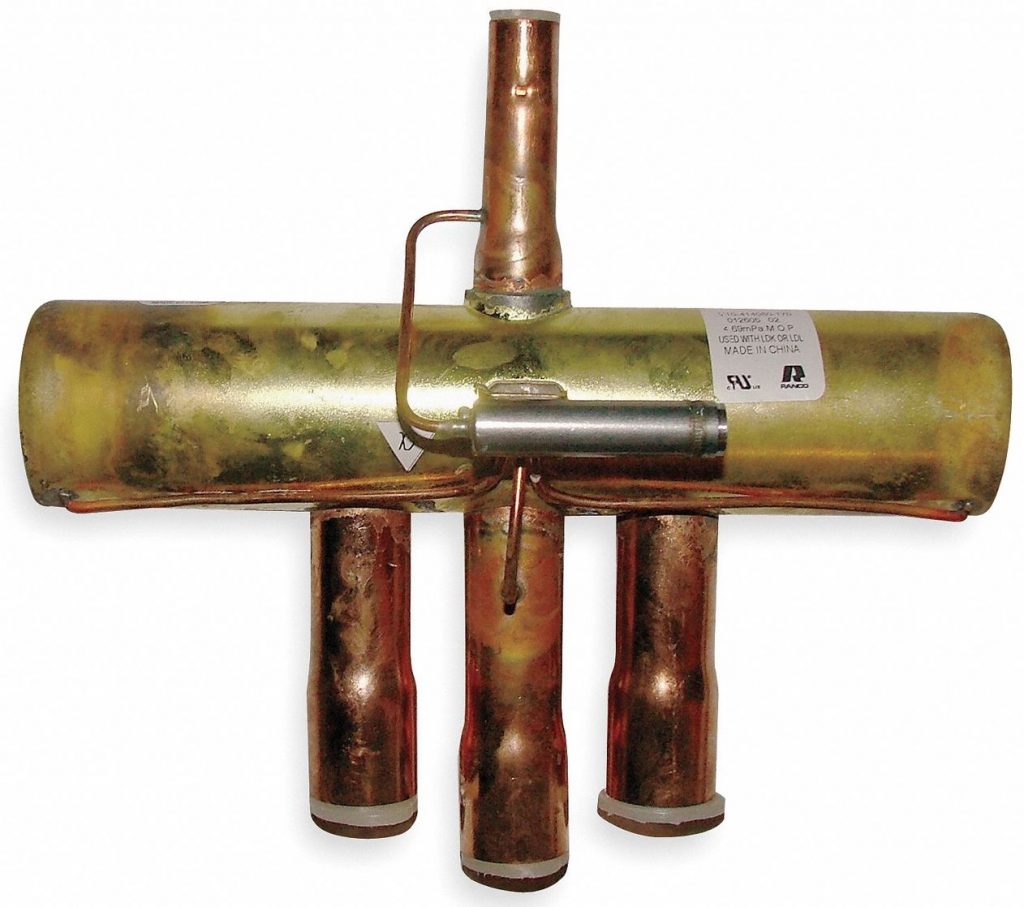
When in cooling mode, the refrigerant usually flow from the compressor to the condenser coil. However, in heating mode the refrigerant flows from the compressor to the evaporator. That is made possible by this valve.
It is important to remember that when a gas is compressed, its temperature increases drastically. Therefore, the refrigerant leaves the compressor as a high pressure superheated gas.
Inside the evaporator unit inside the house, the fan pulls the cold air from the house and passes it over the evaporate coil whereby it absorbs heat from the refrigerant. Warm air is then distributed throughout the house.
Note: In heat transfer, heat is transferred from a point of high concentration to a point of low concentration. That is how the cold indoor air absorbs heat from the hot refrigerant.
As the refrigerant loses heat to the indoor air, it will be condensed into a liquid. Therefore, a heat pump’s evaporator coil works as a condenser coil and vice versa during heating.
Before entering the condenser coil outside the house, the refrigerant first passes through an expansion valve. Its pressure and temperature drops even more (below outside temperature).
With that difference in temperature, it makes it possible for the refrigerant to pull heat from the outside air even during winter. Most heat pumps works perfectly well as long as the temperature outside does not fall below 30 degrees.
So, what happens when the outside temperature falls below 30 degrees?
Heat pumps come with an auxiliary electric heater incorporated to the indoor unit to supplement it when outside temperatures fall below freezing point.
Auxiliary electric heaters are however not very efficient so a hybrid system is more preferred. In a hybrid heating system, the heat pump is the main source of heat but when the temperature falls below freezing point it automatically switches to the furnace.
Heat Pumps vs Air Conditioners: The Pros and Cons
So, between a heat pump and an air conditioner, which is better and which should you install? The not-so-simple answer to that question is “It depends”.
Heat pumps will work very well for some people while air conditioners paired up with furnaces will be the best option for some. The following factors may however help you decide on the best type of HVAC system to install in your home:
1. Energy Efficiency
Most of us just want an HVAC system that will cool our homes during summer and heat them during winter perfectly. We however wouldn’t mind a system that does exactly that while saving us money in the process.
And that is where heat pumps come in. Heat pumps only uses electricity to extract heat from outside while air conditioners need a natural gas-powered furnace, which is not cheap. Heat pumps are therefore very energy-efficient.
The problem however is that electricity prices are not the same everywhere. In areas where electricity prices are way cheaper compared to natural gas, it makes perfect sense to install a heat pump instead of an air conditioner.
Installation of heat pumps in some areas may not be even cost-effective since the cost of natural gas and that of electricity is not that different. This is made worse by the fact that the initial cost of heat pump installation is way higher compared to that of air conditioners.
When used to cool the house, the energy-efficiency of heat pumps and air conditioners is rated using Seasonal Energy Efficiency Ratio (SEER) and Heating Seasonal Performance Factor (HSPF) when used for heating.
These ratings are the equivalent of miles per gallon of your car. The higher the MPG the higher the efficiency of your car. Apart from the engine’s capacity, your driving style (usually a heavy foot) will determine your overall MPG.
SEER ratings indicate how efficient your heat pump or air conditioner is. The higher the rating is the more efficient it is. Now, if your thermostat is set to low or if the house is located in a very hot and humid area, the efficiency will be lower.
HSPF ratings indicate how efficient a heat pump is during its heating mode.
When both the heat pump and air conditioner are used for cooling (summer) their efficiency is almost at par. As temperatures fall and winter approaches (or during moderate winters), heat pumps are more efficient compared to furnaces (paired with air conditioners).
However, when temperatures fall below freezing point, the heat pump on its own will not sufficiently heat the house, prompting the auxiliary electric heater to kick in. When that happens, your utility bills will increase drastically.
2. Location
As I mentioned earlier, heat pumps will be a good option in some location than in others. The same applies to air conditioners.
If you live in an area with a moderate climate (winters are not severe), a heat pump will be a good choice for you especially if the cost of electricity is cheaper compared to that of natural gas.
The heat pump will cool your home during the summer and heat it during winter while saving you money in utility bills at the same time.
On the other hand, if you live in an area whose winters are on the extreme, stay away from heat pumps. An air conditioner paired with a furnace will be the best pick for your home.
Alternatively, you can decide to install a hybrid system which incorporates a heat pump and a furnace. That system is both energy-efficient and intelligent.
When the outside temperatures starts to overwhelm the heat pump, the furnace kicks in, making sure you have constant supply of warm air inside your house.
3. Installation Cost
The cost of installing a heat pump or air conditioner will vary from location to location and will also depend on size and brand among other factors. Nonetheless, it costs more to install a heat pump compared to an air conditioner.
For context, it costs between $3800 and $8000 to install a central air conditioner. On the other hand, it costs between $4000 and $10000 to install a heat pump. The cost will however be higher or lower depending on where you live.
In a nutshell, the upfront cost of acquiring a heat pump is more than that of an air conditioner.
The best thing for you to do would be to contact a local contractor for a breakdown of the total cost of each system. That way you will be in a position to decide which system will be the most economic for you.
4. Lifespan
Another factor to help you determine whether to install a heat pump or air conditioner is their life expectancy. While the lifespan of both systems is determined by several factors, air conditioners tend to last longer than heat pumps.
The main reason heat pumps have a shorter lifespan compared to air conditioners is because they run throughout the year while air conditioners get a break during winter. The continuous running results in wear and tear and hence their reduced longevity.
Having said that, I should also add that the shorter lifespan of heat pumps is compensated/offset by their higher efficiency which saves you money in the long run.
To increase the life of your heat pump or even air conditioner, regular tune-ups by an HVAC technician are recommended.
Conclusion
So, should you get a heat pump or an air conditioner and furnace? Unfortunately, there is no a simple answer for everyone. It will depend from person to person.
I would say that if you live in an area that does not experience extreme winters and also if the electricity costs are not too high relative to natural gas, a heat pump will be a great choice for you.
Otherwise I would just stick with the traditional air conditioner and furnace. This system is not very energy efficient but works very well. It is also a great choice in areas where natural gas prices are low.


